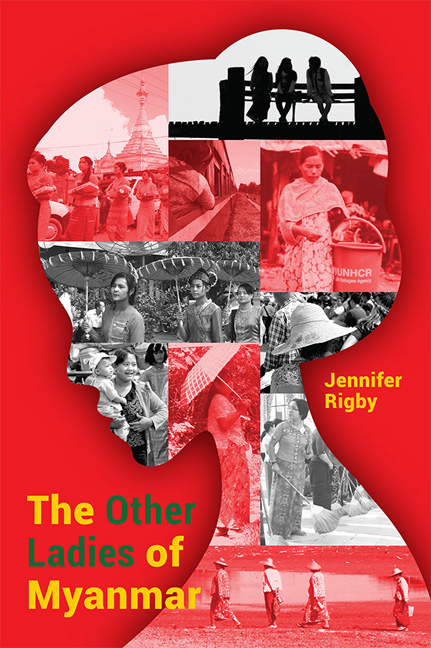Book contents
- Frontmatter
- Dedication
- Contents
- Preface
- Acknowledgements
- Introduction
- Timeline
- 1 The Activist: Cheery Zahau
- 2 The Feminist Buddhist Nun: Ketu Mala
- 3 The Survivor: Mi Mi
- 4 The Businesswoman: Yin Myo Su
- 5 The Environmental Campaigner and Princess: Devi Thant Cin
- 6 The Artist: Ma Ei
- 7 The Refugee Sexual Health Nurse: Mu Tha Paw
- 8 The Rohingya and Human Rights Champion: Wai Wai Nu
- 9 The Farmer: Mar Mar Swe
- 10 The Pop Star: Ah Moon
- 11 The Politician: Htin Htin Htay
- 12 The Archer: Aung Ngeain
- Conclusion
- About the Author
4 - The Businesswoman: Yin Myo Su
Published online by Cambridge University Press: 08 June 2019
- Frontmatter
- Dedication
- Contents
- Preface
- Acknowledgements
- Introduction
- Timeline
- 1 The Activist: Cheery Zahau
- 2 The Feminist Buddhist Nun: Ketu Mala
- 3 The Survivor: Mi Mi
- 4 The Businesswoman: Yin Myo Su
- 5 The Environmental Campaigner and Princess: Devi Thant Cin
- 6 The Artist: Ma Ei
- 7 The Refugee Sexual Health Nurse: Mu Tha Paw
- 8 The Rohingya and Human Rights Champion: Wai Wai Nu
- 9 The Farmer: Mar Mar Swe
- 10 The Pop Star: Ah Moon
- 11 The Politician: Htin Htin Htay
- 12 The Archer: Aung Ngeain
- Conclusion
- About the Author
Summary
YIN MYO Su is probably Myanmar's most famous cat-lover. This makes it a little disconcerting when she tells me, moments after we meet for the first time at her floating hotel on Inle Lake, that she doesn't like cats.
“You will laugh, but I hate cats,” she says, looking down at the bluegrey felines slinking affectionately around her legs. “When I was little, kittens near my house would come and hurt my puppy's nose.”
The cats blink their golden eyes and look back up at her. “I do not like cats,” she repeats, firmly.
But love them or hate them, she has become known for them — not just in Myanmar, but across the world. Yin Myo Su, a hotelier by trade, found out in 2007 that the world-renowned Burmese cat barely existed at all in its homeland, Burma. So she began a mission to bring them back.
Working with a couple of heritage organizations, and starting off with just seven cats bought from collectors around the world at eye-watering expense — including breeders in Australia and the pet department of London's Harrods department store — she now has around forty felines, living on an island of their own (I'm not joking) on the picturesque lake in Shan State, attached to the hotel she runs. She lives at another hotel, across the lake.
The cats are housed in mini-replicas of Burmese royal palaces, a nod to their rumoured heritage as palace guards for Burma's ancient kings and queens. Their home is called the Burmese Cat Village, and signposted as such. They have pedicures and manicures, family planning, a dedicated staff, and even a honeymoon suite. One of them even tweets (@Phyuley).
Some are given away to locals, and foreigners can also buy the beasts, at a price-tag of US$600. Aung San Suu Kyi even had one, but she had to give it back because her dog was jealous
The project is about more than just pet cats, though.
“I see Burma losing the things we have, like jade, and as the country opens up we could do something that would preserve our heritage,” says Yin Myo Su, a petite, forty-four-year-old bustling businesswoman, who usually dresses in jewelled colours and is known to most as Misuu.
- Type
- Chapter
- Information
- The Other Ladies of Myanmar , pp. 33 - 46Publisher: ISEAS–Yusof Ishak InstitutePrint publication year: 2018

